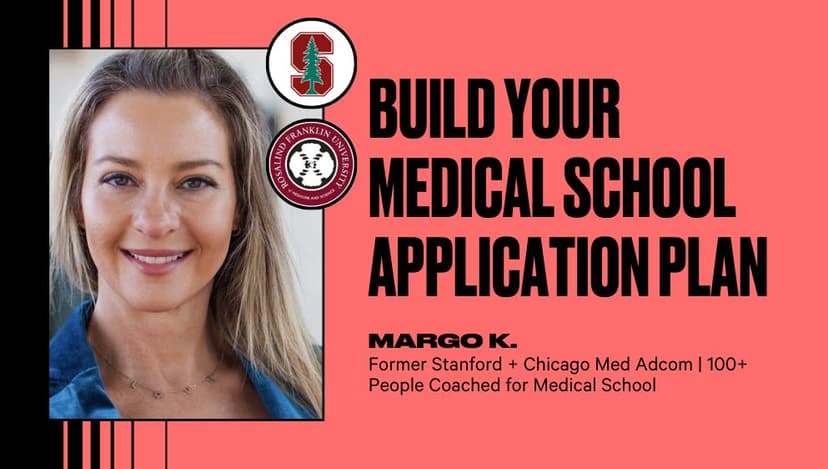How to Answer the "Tell Me About Yourself" Residency Interview Question
Are you preparing for a residency interview and struggling with how to answer "Tell me about yourself" question? This article provides expert tips and strategies to help you craft a compelling and memorable response that sets you apart from other candidates.
Posted July 23, 2025

Join a free event
Learn from top coaches and industry experts in live, interactive sessions you can join for free.
Table of Contents
One of the most common residency interview questions is deceptively simple: “Tell me about yourself.” Despite its conversational tone, this question can trip up even the most well-prepared medical students. In this detailed guide, we’ll take a deep dive into answering this question effectively, with real-world advice from program directors and medical students, a tactical structure, specific examples, and interview preparation strategies.
By the end, you'll be ready to respond with confidence, clarity, and authenticity, and stand out from other candidates.
Why Do Program Directors Ask, “Tell Me About Yourself”?
Residency program directors from top medical schools already know your grades, scores, and personal statement. What they don’t know is how you present yourself in person, how you speak, reflect, and effectively communicate. That’s what this question is about.
According to several program directors, this question helps them assess:
- How well you answer interview questions without a script
- Your level of self-awareness
- Your fit with their residency program
- How you handle open-ended or ambiguous prompts, much like real-life conversations with patients or peers in the healthcare system
In one Reddit thread, a medical student shared: “It’s not about repeating your CV. They want to know what you emphasize, how you narrate your journey, that’s what tells them about your priorities and personality.”
What This Question Is Really Testing
Let’s clarify the key aspects of this question:
- It’s often the first question of the interview day, so it sets the tone
- It tests your interview preparation and how well you know your own story
- It’s an opportunity to showcase your personal qualities, problem-solving skills, and communication style
- It offers a natural way to lead into follow-up questions — giving you control of the narrative
How to Structure Your “Tell Me About Yourself” Answer
Here’s a proven structure used by successful residency interviews candidates:
1. Start With a Hook: Your “Why Medicine” Moment
Begin with a defining moment or core value that drove you toward medicine.
For example: “Growing up, I watched a family member battle a chronic illness, and that experience sparked my interest in both biology and patient advocacy.”
2. Highlight Your Journey Through Medical School
Touch on clinical experiences, leadership roles, or research projects that shaped you. Be specific:
“During my third-year clinical rotations, I discovered my passion for internal medicine, especially the diagnostic process and working with complex cases.”
Read: How Many Medical Schools Should I Apply To? A Strategic Approach
3. Connect to Your Chosen Specialty and Career Vision
Tie your story to your future:
“My long-term career goals include academic leadership in internal medicine, with a focus on mentoring students and improving care systems.”
4. Close With Why You’re Excited About This Program
Tailor the ending to each residency program:
“I’m drawn to your program’s emphasis on research and resident wellness, and I’d be excited to contribute to that community.”
This format is engaging, logical, and helps the interviewer ask more meaningful follow up questions, such as details about your volunteer work, research projects, or extracurricular activities.
Real Advice From Residents
Medical students offered these general tips:
- Avoid the life story trap: Stay focused on your professional journey.
- Use storytelling: “I remembered a patient who thanked me for simply listening, it made me realize how impactful small actions are in patient care.”
- Be authentic: Don’t try to be perfect. Talk about real growth, even if it includes mistakes.
- Practice out loud: Record yourself or do mock interviews with a mentor.
Common Mistakes to Avoid
Even well-prepared applicants can fall into these traps:
- Reciting your CV verbatim
- Speaking too long or too vaguely
- Forgetting to mention your chosen specialty
- Not linking your story to the residency program
- Sounding robotic instead of natural
One way to sidestep these issues is to use the STAR method (Situation, Task, Action, Result) when discussing key experiences. This adds structure and helps communicate transferable skills clearly.
Tactics to Stand Out From Other Candidates
If you want your answer to stand out, integrate these advanced tips:
- Use personal anecdotes: Show, don’t just tell.
- Mention new skills you’ve gained recently that align with the program's goals.
- Reference a specific job responsibility of the residents and how you’re ready for it.
- Highlight research projects or leadership roles that demonstrate initiative.
- Be aware of your body language and eye contact, both matter, even in virtual settings.
How to Practice for Success
Effective interview preparation can turn a good response into a great one, especially when tackling open-ended prompts like the “tell me about yourself residency interview” question. Here’s a step-by-step approach to ensure you're well prepared and confident on interview day:
1. Write It Out - Thoughtfully
Start by outlining your key clinical experiences, research projects, and relevant skills. Write your answer in full sentences to clarify your narrative, but avoid scripting every word. You want to sound natural, not rehearsed. Focus on hitting key points and keeping the structure logical and compelling.
2. Read It Aloud - Then Refine
Reading your response aloud helps catch awkward phrasing or unclear transitions. Adjust as needed for flow and tone. Make sure it reflects your personal qualities, professional identity, and connection to your chosen specialty.
3. Record Yourself - And Watch It Back
Use your phone or webcam to record practice runs. Pay attention to:
- Pacing: Are you rushing or dragging?
- Tone: Do you sound engaged and confident?
- Body language: Are you making eye contact? Smiling? Fidgeting? This reflection helps improve delivery and identify nonverbal habits.
4. Conduct Mock Interviews
Simulate real-time pressure by practicing with a peer, mentor, or coach. Ask them to follow up with subsequent questions based on your answer. This prepares you to think on your feet and shows whether your intro invites a meaningful conversation.
Tip: Try doing mock interviews with both familiar and unfamiliar people to adapt your communication style for different personalities, just like you’ll encounter on your actual interview day.
5. Review Peer Responses and Sample Answers
Studying sample answers from past applicants can reveal patterns in what works and what doesn’t. Reddit, student forums, or international medical graduates discussion boards often feature helpful examples. Analyze how others balance storytelling with professionalism and how they respond to common residency interview questions.
6. Get Feedback From Mentors
Ask trusted mentors, attendings, or residents to review your response. They can help you refine language, emphasize your strengths, and identify any potential concerns or blind spots. They may also suggest additional resources or sample questions to explore.
7. Practice the Unexpected
Sometimes, the program director will rephrase the same question differently, such as “Walk me through your journey into medicine” or “What would you want us to know that’s not on your CV?” Prepare variations of your answer to remain flexible and conversational.
8. Rehearse in a Real Setting
If possible, practice in the same setup you’ll use for your interview, especially if it’s virtual. Check your internet connection, lighting, and background. Dress professionally to reinforce the seriousness of the event and get into the right mindset.
Example Answer Using This Structure
Here’s a sample answer based on everything above:
“I was drawn to medicine after seeing the difference a compassionate physician made in my grandmother’s life. That led me to volunteer in hospice care and later pursue medical school. In my second year, I took part in a community health initiative, that’s where I realized my passion for internal medicine and continuity of care. I also worked on a quality improvement research project focused on hospital readmission rates. My goal is to practice in underserved communities while contributing to resident education. I’m especially excited about your program’s focus on mentorship and innovation in teaching.”
Expect These Follow-Up Questions
After your response, you’ll likely face subsequent questions like:
- “Can you tell us more about that research project?”
- “Why did you choose your specialty?”
- “What’s a challenge you’ve overcome in medical school?”
- “How do you maintain balance outside of work?”
- “What role do you hope to play in a residency program?”
Each of these is a chance to delve deeper and show how your educational background, life experiences, and values align with the program.
Final Words From Program Directors
Here’s advice straight from program directors across specialties: “Confidence and humility go hand-in-hand. Be proud of your journey, but don’t oversell it.” “We can tell when someone’s rehearsed vs. genuinely thoughtful.” “Your answer should reflect curiosity, not perfection.”
How Top Medical School Coaches Can Help
Working with top medical school coaches can elevate your interview performance from good to exceptional. These experts offer personalized feedback, help you refine your answers for clarity and impact, and guide you in showcasing your unique strengths. Whether you're struggling with how to answer the “tell me about yourself” residency interview question or want to fine-tune your overall strategy, a coach can provide the structure, support, and insight you need to stand out to residency program directors.
Read next:
- The Most Common Physician Assistant (PA) School Interview Questions – and How to Answer Them
- Medical School Update Letter – What it Is & How to Write One (With Examples)
- Top 10 Medical Schools in the U.S.
- The Different Types of Medical Careers – and Which One is Right for You
- DO vs. MD: Degree Differences in Education, Jobs & Salary
- How Long is Medical School – A Year-by-Year Breakdown
FAQs
How long should my response be?
- Aim for a concise answer, ideally between 1 to 2 minutes, to maintain the interviewer's attention.
Should I include personal information, like hobbies or family background?
- Briefly mentioning personal interests can showcase your well-roundedness, but ensure they are relevant and professional.
How can I tailor my response to the specific residency program?
- Research the program's values and strengths, and align your experiences and goals accordingly.
Is it appropriate to discuss weaknesses or challenges in this answer?
- Focus on positive aspects; reserve discussions about weaknesses for when specifically asked.
How do I avoid sounding rehearsed or robotic?
- Practice your answer to sound natural, and be prepared to adapt based on the interview's flow.
Should I mention experiences not included in my application?
- Yes, introducing new relevant experiences can provide a fuller picture of your qualifications.
How can I effectively incorporate storytelling into my response?
- Use brief anecdotes that highlight your journey and passion for medicine.
Is it advisable to discuss future career goals in this answer?
- Yes, connecting your past experiences to future aspirations demonstrates foresight and commitment.
How can I ensure my answer doesn't come across as arrogant?
- Present your achievements humbly, emphasizing teamwork and learning experiences.
Can I ask clarifying questions before answering?
- It's best to provide a prepared response; asking for clarification might suggest a lack of preparation.

























